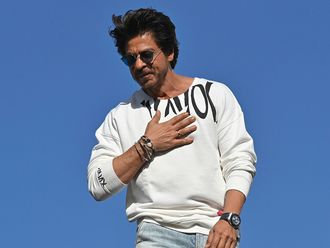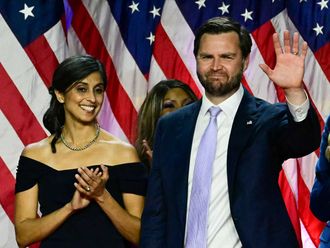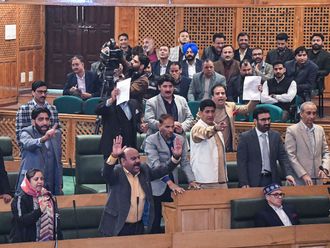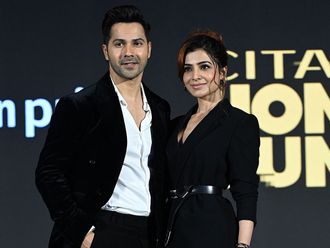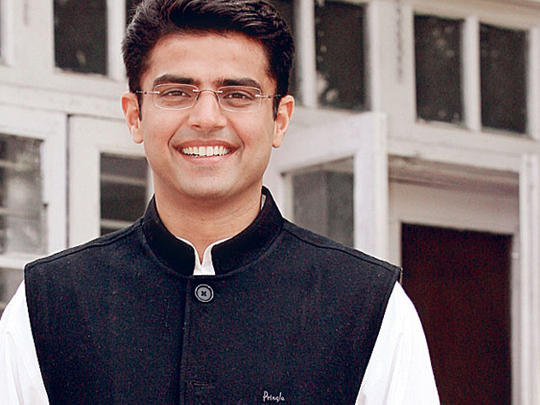
New Delhi: Sachin Pilot is among the confident new breed of politicians who articulate the ethos of modern India.
His political baptism may be courtesy of his parents, but he has carved a niche for himself ever since he joined politics in 2002. Representing the Congress Party at 26, Sachin became the youngest member of parliament in the country in 2004.
With a humble disposition coupled with an ability to put his views across forcefully, Pilot is all set to make his own impression on the Indian political landscape.
Having set lofty goals for himself, Pilot says, "I want to see telecom revolution in the country. It's not just metropolitan cities like Delhi and Mumbai, but people in other parts of the country should also feel the difference. What about Jharkhand and Nagaland? States like these are what I am focusing upon."
The federal minister of state for communications and information technology shared his views with Gulf News in an exclusive interview.
GULF NEWS: Way back in the 1990s you'd accompany your father during his village tours. Did you then foresee yourself in your current position?
SACHIN PILOT: As long as my father was alive, I had no plans or ambitions to be in public life. I used to help him in his political campaign as any son would. Beyond that, I never thought of entering active politics. But after he passed away in a tragic road accident, circumstances changed and I had to take the responsibility. I fought the Lok Sabha elections and realised that politics was a good platform to serve the people. My experience of what I learnt as a child and during my growing-up days, and my interactions with people, helped.
Educated abroad but after your father's demise projected as a Gujjar community leader, was there a dichotomy involved in constantly having to juggle roles?
The identity which one is born with is a fact of life. But how you use it and what work you do, the ideologies you follow and how committed you are to the cause depends on an individual. I most certainly represent the Gujjar community, my district and the state, but more importantly, I represent India. I am proud of my roots and background and I don't think there's a dichotomy or contradiction in that. One has to balance both worlds — the country and the farmer community and the backward section of the society where I come from. And I am making sure that we are able to give the best technologies and mobile phones services to all sections of the society at the best possible costs.
Prior to my joining politics my mother was a member of parliament and then the [Congress] party gave me an opportunity and I won by a good margin. Life sometimes throws challenges and circumstances do not always allow you to make decisions. Some decisions are taken for you. But I am very happy and satisfied in the job that I am doing.
Your father always fought elections from Dausa constituency in Rajasthan. But after the delimitation of the constituency, when the Congress party decided to field you from Ajmer, was there any anxiety?
My father was a six-time MP from Dausa, my mother represented the same constituency once and I, too, won from there. But yes, because of delimitation, the constituency became reserved for Scheduled Tribes. I was then asked to contest from Ajmer, the seat, which the Congress had not won for 25 years. So, it's a great achievement for the party. It all happened due to the leadership and the kind of work the Manmohan Singh government had done. And I think it was the young people who were quite enthused to have a young candidate to represent them. Also, my work in Dausa must have played a role to have this impact.
Towards the end of his life, your father's relations with the Congress were not very good. But you've developed cordial relations with Rahul Gandhi. Where did the initiative come from?
Let's not forget the reason why my father entered politics. It was because of Indira Gandhi, who gave him the opportunity to leave his air force job and join politics without having any political background or experience. He was only 35-years-old then. After her passing away, Rajiv Gandhi made him the minister and they worked very closely. I think it is because of the Gandhi family that people like us are coming to the forefront.
As a family, we believe in the ideology of the Congress party, which is ingrained in our system. And with Rahul Gandhi spearheading the party, it gives us a lot of encouragement, confidence and hope that young people will now be able to really demonstrate all their energies.
What have been your initiatives for youngsters of the constituency?
I am ensuring that after young boys and girls finish school and college, they get skills that equip them to handle today's challenges. They should be able to join vocational training centres, call centres, computer courses and technology courses. Good infrastructure facilities provide better opportunities to youngsters to progress in life. We have planned multiple projects for Ajmer including an airport and 11 new trains. Soon it will also have a world-class railway station.
There's a general notion that young, talented politicians are suppressed in the Congress party to keep Rahul Gandhi in the forefront. Has any hint ever been made to you to keep a low profile?
At the age of 26, I was given a chance by the party to become a member of parliament and at 31 I was made a minister, handling an important portfolio. There are several people like me in parliament and state assemblies who are now members of legislative assemblies. I think Congress is the only party that recognises the real strength, talent and true potential of the young generation. And now Rahul wants elections in the Youth Congress. What more could the party have done for me or other youngsters.
Amongst some father-and-son members of parliament, Dr Farooq Abdullah and you are a rare father-in-law and son-in-law team — both ministers in the UPA government. Being from different parties, how do you balance things when there is a difference of opinion?
We must segregate personal and political life. There are certain party ideologies and I stick to them. With the National Conference (NC), of which my father-in-law is a patron, we have a coalition government in Jammu and Kashmir and are coalition partners at the Centre, as the NC is supporting the UPA government. But our politics stays separate from our family life. And as long as everyone works together for the betterment of the nation, there is no issue.
You were instrumental in bridging the gap between the Congress and the National Conference in Jammu and Kashmir after the 2009 elections. Was it easy to get your brother-in-law Omar Abdullah and friend Rahul Gandhi together?
It's not a personality issue. It was the need of the hour. The Jammu and Kashmir assembly got a fragmented mandate. It's an important state and we couldn't have a limbo. So, the two parties got together and the interests of the state were looked into. We all worked together to come to an amicable solution and have a stable government. The faith shown by the people, wherein in some parts of the state the polling was almost 80 per cent, [the] requirement of good governance was a foremost thing.
You proved a convincing politician having struck a fine balance to control the agitating Gujjar community demanding Scheduled Tribes status in Rajasthan in 2008. How did you manage to placate them?
People were demonstrating, which in a democracy is fine. But the Bharatiya Janata Party (BJP) government in power in the state at that time was harsh in dealing with them and 70 people lost their lives in police firing. That's unacceptable in a democracy. So, we had to step in to ensure peace. I feel every problem can be resolved through talks and negotiations. It's important to have a conversation as opposed to taking strong postures. Loss of life is obviously sad, and to prevent it we got people to negotiate. And when we took charge a year ago, we made sure that the problem was resolved. Now only a judicial clearance is required for the new law to be in place.
In your opinion, should the country go in for a caste-based census?
Caste unfortunately is a reality in our country. But it is the most deprived sections who are sometimes not able to receive the benefits meant for them. Therefore, to have more targeted efforts of giving resources, financial and administrative help, we need to have a database. And unless we have that we'll not be able to target the subsidies and programmes. The other view is that it may lead to further divisions within society, as some people could have political agendas on their minds. That's my apprehension. But I feel we must have a pragmatic view and consensus on the issue.
Your vision for India vis-à-vis the telecom sector?
We have both — the infrastructure and technology, the cheapest call rates in the world and are adding 15-18 million new subscribers every month. There are 600 million mobile subscribers. It's good that all this is happening. But we need to further take mobile telephony down to the village level and into the far-flung areas of India, the north-east, Jammu and Kashmir and the tribal belts. All this is the government's job, because private companies don't go to non-profitable areas. So people who are on the fringes, whether geographical or societal, have to be inculcated into the realm.
Do you have ambitions of becoming the prime minister?
Not at all. I am happy to have come this far in life. It's good to be ambitious, but not over-ambitious. My ambition is to discharge my responsibilities and meet the expectations that people have from me. I am fortunate to have this ministerial job and have proved myself. In politics nothing is permanent. It's all very dynamic. So as long as I am here, I should be able to make a difference to people's lives. And I hope and believe that ultimately some of my good work will be remembered.
Early initiation into politics
- Sachin Pilot was born on September 7, 1977 in Uttar Pradesh to Rama and Rajesh Pilot.
- Early education from Air Force Bal Bharati School, New Delhi — 1994.
- Did his BA (Honours) from St Stephen's College, University of Delhi — 1997.
- Enrolled for a correspondence programme with the Institute of Management Technology, Ghaziabad, while simultaneously working with General Motors — 1997-99.
- Went to study at the Wharton Business School, University of Pennsylvania, Philadelphia, US — 1999-2001.
- Joined the Congress Party — 2002.
- Won the Lok Sabha elections from Dausa, Rajasthan - 2004.
- Won the Lok Sabha elections from Ajmer in Rajasthan and appointed federal minister of state for communications and information technology — 2009.


